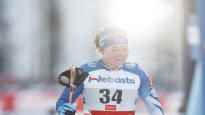After Rukal has passed, Krista Pärmäkoski has made a strong impression in the prestigious competitions. In Saturday’s result, you shouldn’t look at the ranking, but at the time difference to the top, writes Atte Husu.
Krista Pärmäkoski is healthy while staying in Planica, a World Cup medalist.
Admittedly, the declaration is harsh. And it’s based on one World Cup competition.
But when you compare Pärmäkoski’s successful conditioning times in the prestigious races and the season openings that formed the basis for them in Ruka, it’s hard to avoid the thought of a medal.
The star of Ikaalisten Urheiliøde has achieved five individual medals, the first of which, the World Championship silver, came in Lahti in 2017.
A year later, at the Pyeongchang Olympics, Pärmäkoski became the first Finn to reach the summit Marja-Liisa Kirvesniemen and three individual medals at the 1984 Sarajevo Olympics.
Pärmäkoski had to wait four years for the next one, until last February at the Beijing Olympics the bronze medal of the intermediate start was hung around his neck. Between the Olympic medals, Pärmäkoski also had time to come close to the podium: at the 2019 World Championships in Seefeld, the bronze in the intermediate start escaped with a difference of 1.4 seconds.
Pärmäkoski has been in top condition in Ruka during all the above-mentioned value competition seasons. The 28th place in Ruka’s ten in November 2017 is a cosmetic defect, which was explained by a maintenance failure and was confirmed by two podium positions in the following weekends of the World Cup.
When Pärmäkoski has been fit in Ruka, he has always been among the strongest medal favorites in prestigious competitions. Even now.
Experience favors success
Pärmäkoski is not the only one to which the connection between Ruka and the results of prestigious competitions applies.
In the last ten years, the woman who has won the intermediate start in Ruka has almost invariably celebrated at least one individual gold medal a few months later.
Last year was the only exception, when in Ruka Therese Johaugin hit Frida Karlsson failed at the Beijing Olympics. At that time, Pärmäkoski was also fifth in the terrains of Northeast Finland and once again timed his fitness masterfully for the five-ring competition.
When comparing this year’s and last year’s Ruka top ten results list, Pärmäkoski has almost the same four: the Swedes Karlsson and Ebba Anderssonof Germany Katharina Hennig and one Norwegian, replacing Johaug this year Anne Kjersti Kalvå.
When we next look at Pärmäkoski’s and the above-mentioned women’s early season results and their ability to properly time the prestigious races, the balance of the 31-year-old Finn does not pale in comparison to anyone. Vice versa.
Andersson, who celebrated his victory on Saturday, has been on the podium 29 times since 2018 in the World Cup individual competitions, but his showcase is decorated only with two World Cup bronze medals from the 2021 Oberstdorf Games as personal merits.
Since November 2018, Pärmäkoski has been behind Andersson every time in the prestigious competition years at Ruka, but in two of the three main events of the season, Pärmäkoski has been in better shape than the Swede.
Distance to the top
When it comes to the medal speeches, the skiing team, when looking at the results of Ruka, has always paid attention to what is the difference between an athlete on the top and on the podium.
Closing the gap of half a minute in the next few months is completely within the bounds of realism. In the case of the best, we can talk about almost a minute.
When Pärmäkoski was second in the Ruka World Cup, which opened the World Cup season in Lahti in November 2016, the difference to the winner of the competition Marit Björgen was a measly 4.6 seconds.
After this, Pärmäkoski’s gap to the podium has been at least 19.9 seconds for Ruka until yesterday. On Saturday, he was 18.3 seconds behind the winner Andersson and exactly five seconds behind the third-placed Hennig, who did not have a personal race medal.
Although Pärmäkoske was not seen on the podium on Saturday, thanks to the result, on the night before Sunday, a restful skier slept at Takuu. This medal train has found its end point before.
What thoughts did the story evoke? You can discuss the topic until Monday evening, November 28. until 11 p.m. Commenting requires a ID.
